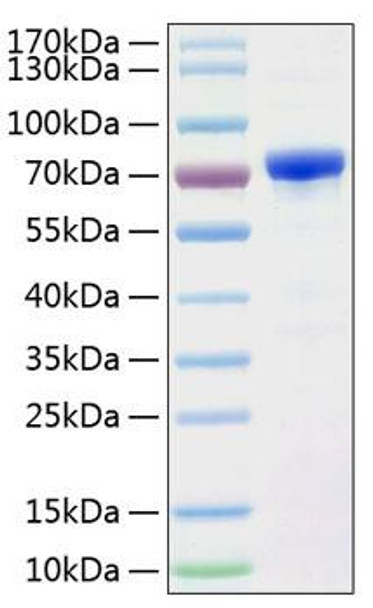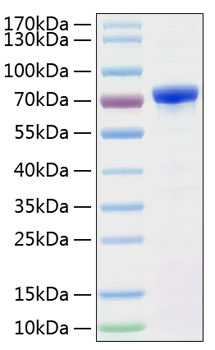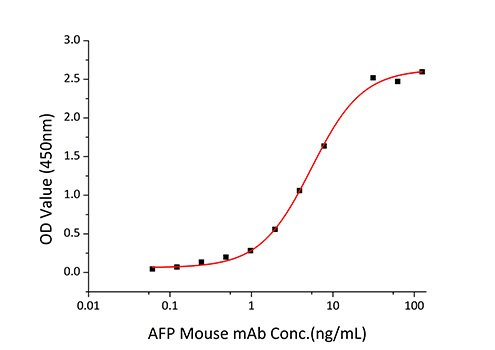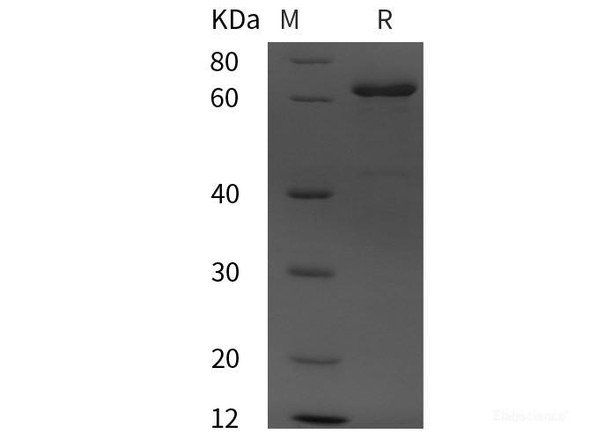Description
Recombinant Human Alpha-fetoprotein/AFP Protein
The Recombinant Human Alpha-fetoprotein/AFP Protein is a biologically active recombinant protein that plays a significant role in various cellular processes and signaling pathways in human biology. This protein is widely employed in immunological research, cell biology studies, protein-protein interaction analyses, and therapeutic development, providing researchers with a reliable tool for investigating Alpha-fetoprotein/AFP function and its implications in health and disease.
This product (SKU: RPCB0326) is produced using HEK293 cells and features a C-His tag for convenient detection and purification. The protein exhibits a calculated molecular weight of 67.32 kDa with an observed molecular weight of 70-75 kDa under denaturing conditions, achieving ≥ 95 % as determined by SDS-PAGE.. Functional bioactivity has been validated through rigorous quality control assays, confirming its suitability for demanding research applications.
Key Features
| High Purity by Affinity Chromatography | |
| Mammalian & Bacterial Expression Systems | |
| High lot-to-lot consistency via strict QC |
| Product Name: | Recombinant Human Alpha-fetoprotein/AFP Protein |
| SKU: | RPCB0326 |
| Size: | 10 μg , 20 μg , 50 μg , 100 μg |
| Reactivity: | Human |
| Synonyms: | AFPD, FETA, HPAFP, AFP |
| Tag: | C-His |
| Expression Host: | HEK293 cells |
| Calculated MW: | 67.32 kDa |
| Observed MW: | 70-75 kDa |
| Gene ID: | 174 |
| Protein Description: | High quality, high purity and low endotoxin recombinant Recombinant Human Alpha-fetoprotein/AFP Protein (RPCB0326), tested reactivity in HEK293 cells and has been validated in SDS-PAGE.100% guaranteed. |
| Endotoxin: | < 0.1 EU/μg of the protein by LAL method. |
| Purity: | ≥ 95 % as determined by SDS-PAGE. |
| Formulation: | Lyophilized from a 0.22 μm filtered solution of PBS, pH 7.4.Contact us for customized product form or formulation. |
| Bio-Activity: | Measured by its binding ability in a functional ELISA. Immobilized Human AFP at 2 μg/mL (100 μL/well) can bind AFP Mouse mAb with a linear range of 0.061-5.431 ng/mL. |
| Reconstitution: | Centrifuge the vial before opening. Reconstitute to a concentration of 0.1-0.5 mg/mL in sterile distilled water. Avoid vortex or vigorously pipetting the protein. For long term storage, it is recommended to add a carrier protein or stablizer (e.g. 0.1% BSA, 5% HSA, 10% FBS or 5% Trehalose), and aliquot the reconstituted protein solution to minimize free-thaw cycles. |
| Storage: | Store at -20℃.Store the lyophilized protein at -20℃ to -80 ℃ up to 1 year from the date of receipt. After reconstitution, the protein solution is stable at -20℃ for 3 months, at 2-8℃ for up to 1 week. |
AFP is Alpha-fetoprotein classified as a member of the albuminoid gene superfamily consisting of albumin, AFP, vitamin D (Gc) protein, and alpha-albumin. AFP is a glycoprotein of 591 amino acids and a carbohydrate moiety. AFP is one of the several embryo-specific proteins and is a dominant serum protein as early in human embryonic life as one month, when albumin and transferrin are present in relatively small amounts. It is first synthesized in the human by the yolk sac and liver(1-2 months) and subsequently predominantly in the liver. A small amount of AFP is produced by the GI tract of the human conceptus. It has been proved that AFP may reappear in the serum in elevated amounts in adult life in association with normal restorative processes and with malignant growth. Alpha-fetoprotein (AFP) is a specific marker for hepatocellular carcinoma (HCC), teratoblastomas, and neural tube defect (NTD).








